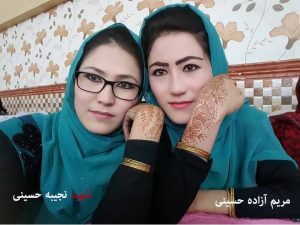Every Explosion Reminds Me of That Day

She speaks of her sister’s interest and endless efforts pursuing higher education. Graduation from high school aspired her to pursue further education in India. At that time, parents in Daykundi did not allow their daughters to study. However, her parents allowed her to go to India. Maryam Azadah Hussaini said that her sister Najiba Hussaini successfully finished her bachelor’s degree despite of challenges and being away from home.
Najiba Hussaini returned to the country after accomplishing her bachelor’s degree in 2011 and worked in a department of the Ministry of Mines and Petroleum. In 2014, she secured a merit-based scholarship in Japan. She received her master’s degree and returned to Afghanistan. She started her previous job until one day all things has changed forever.
Najiba had thrived despite of adversities and challenges. Unfortunately, her successes turned into grief. She died of a suicide attack by Taliban in the vehicle of the employees of the Ministry of Mines and Petroleum going to the workplace just a few days after her family celebrated her 28th birthday.
On the day of the incident, Maryam arrived at the scene first. Since their parents live in Daykundi, Maryam, her brother, her relatives, and Najiba’s colleagues started searching for her body. Maryam finally identified Najiba’s body in the hospital.
As Najiba’s only sister, Maryam not only bears the brunt of the bitter memories of the day of the accident over the sweet memories with her sister but also remembers Najiba’s day-and-night efforts to achieve her dreams, which eventually all caught fire with her. Maryam shared the same room with Najiba and witnessed her efforts for getting acceptance for Japan’s scholarship. Every time she woke up, she saw Najiba studying tirelessly to achieve her desired result.
Ms. Hussaini said that she and her family have not yet been able to cope with Najiba’s absence. Nonetheless, they have no other choice but to accept that this has happened and that she is no longer among them.
What makes coping with the absence of Najiba and forgetting the tragedy of that day of the incident for Maryam and her family is to hear the sound of explosions and the news of suicide attacks. The sound of every explosion reminds them of her loss. She said that our body is weakened, and we tremble when the annoying sound of an explosion comes to our ears. We understand the pain of families who lose their beloved ones, and we know how difficult it is for them to cope with this pain.”
As we hear Maryam’s heartbreak and the sad story of her sister, the peace negotiations still do not have a desired outcome while dozens of other girls are being sacrificed like Najiba.
Ms. Hussaini said that although the families of the victims are the most affected by the war, none of their representatives is present in the peace talks. Therefore, the peace process is not inclusive. “We have lost our beloved one in this way and we bear the pain of their absence. If our voice is not heard in the peace talks, this peace is not inclusive.” She said.
Expressing frustration regarding the Taliban’s view of women, she said that the Taliban’s view of women has not changed yet. She added that Taliban imprisoned women at home and violated their rights.
Ms. Hussaini said that no restriction on women’s rights is acceptable for her and no human rights should be violated for the purpose of achieving a peace agreement.